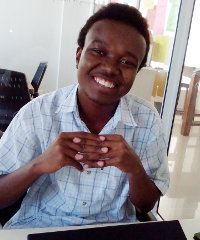Start-up snapshot: Tanzanian IT entrepreneurs juggling studies and business
Start-up: Irabu Systems Limited
Julius Moshiro, 22, is co-founder of Irabu Systems Limited, a Tanzanian software development company. While in high school he partnered classmate Masasi Mgengeli to build Katiba Forum, a platform enabling citizens to participate in Tanzania’s Constitution formulation process. In 2012, their innovation won a gold medal prize in the programming category of the Infomatrix Africa competition. Later that year the duo co-founded Irabu with two other students.
Moshiro tells How we made it in Africa about his experiences juggling his studies and business, and his dreams for Irabu.
1. Give us your elevator pitch.
Irabu is a software development company and our philosophy is ‘simplify’. We want to develop simple solutions that can easily be adopted by the masses. We have worked with various clients in the past in developing solutions such as a collateral management system. We also build websites and offer IT consultancy services to companies wanting specific technology solutions. We are currently building a sales management system to help sales people manage their records such as the number of people they approached in a day, how many they turned into a client, and what strategies worked and so forth. We are building this solution in partnership with another IT company. Today we are making enough money to cover the company’s bills and support ourselves as well as pay for our university education. However, our goal is to develop a few products targeted at the mass market, monetise that, and have a financially strong entity that will employ many people.
2. How did you finance your start-up?
We only needed laptops. Our parents gave us the money to buy laptops and also pay for the registration of the company.
3. If you were given US$1m to invest in your company now, where would it go?
In the past few months we have studied various problems in the market to identify those that are widespread. Our goal is to identify a few problems, and build businesses around the solutions. Having that kind of financing would help us fast-track the research process, pilot some solutions and the eventual roll out of the products we settle for. We are also working on an information-sharing solution that will help businesses have access to contacts of potential clients. So having $1m would help us move faster in implementation of projects in the pipeline.
4. What risks does your business face?
Our biggest challenge is time. All four of us co-founders are in university and have to juggle studies and business. I worry other people might implement our ideas and get to market before we do. So the fact that our time is not solely focused on the business is a risk. Secondly, we are endowed with technical skills but do not have sufficient financing. That is why in the solutions we are currently building, we had to partner other companies more financially stable.
5. Describe your most exciting entrepreneurial moment.
It must be that moment in high school, in 2012, during the Infomatrix competition when we created a solution that won a gold medal in Africa and a silver medal in the global competition in Romania. We built a platform called Katiba Forum that enabled Tanzanians to contribute their opinions in the process of making the new Constitution. (Tanzanians will hold a referendum on a new constitution in April.) At that time we had only been using computers for two years, yet we outperformed even students from more developed economies who have had access to computers from an early age. It made us realise we have potential, and gave us the desire to achieve more.
6. What has been the biggest mistake you have made in your start-up, and what have you learnt from it?
The company we are partnering with in developing the sales management system initially wanted to hire us. The owner offered to pay us to build and maintain the product. In that arrangement we would be his employees and he would have sole-ownership of the product. Initially we said ‘yes’, but later realised we had made a terrible mistake. We should have asked for a stake in the product. We talked to him again, and fortunately were able to correct that mistake.


